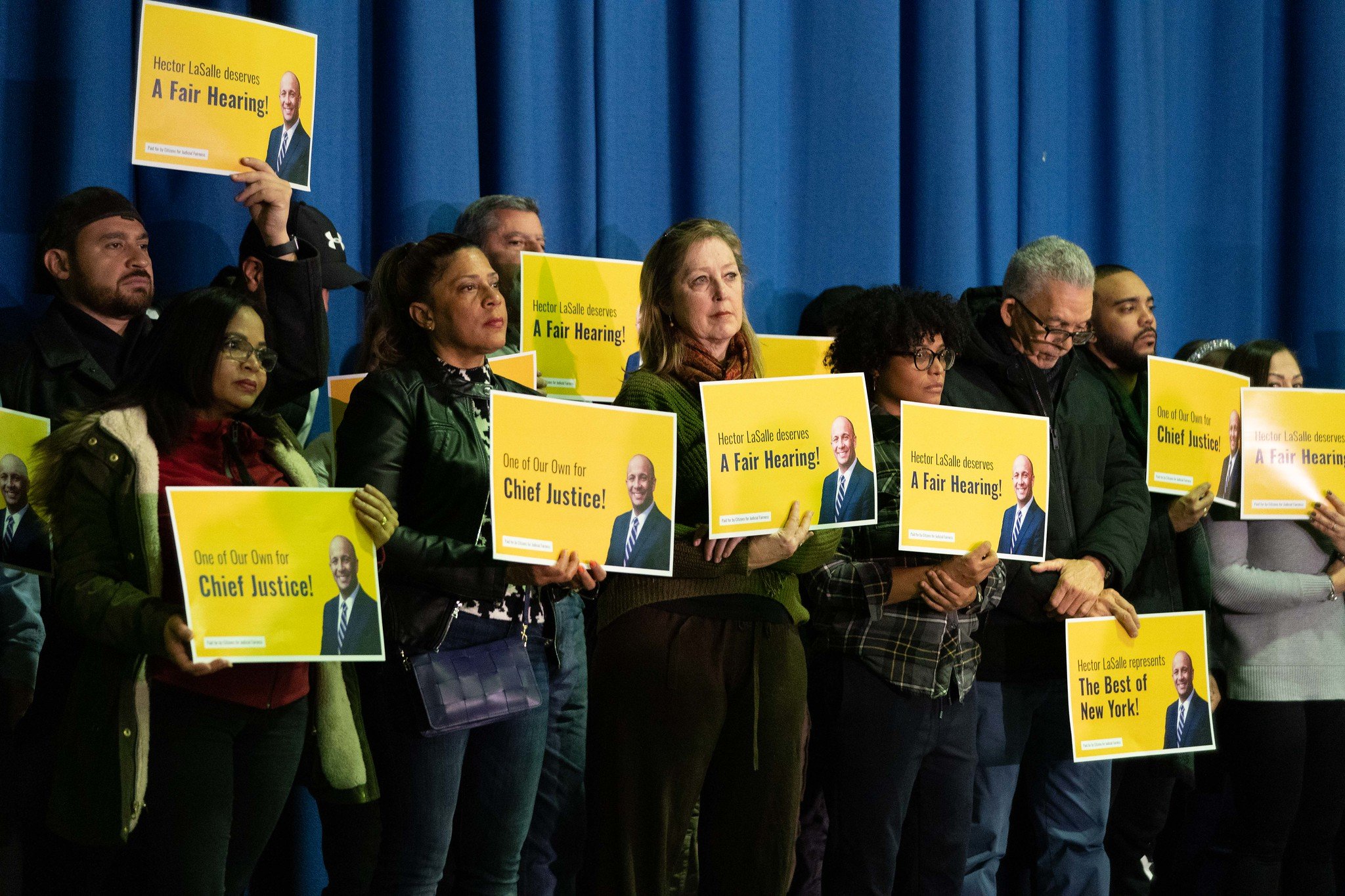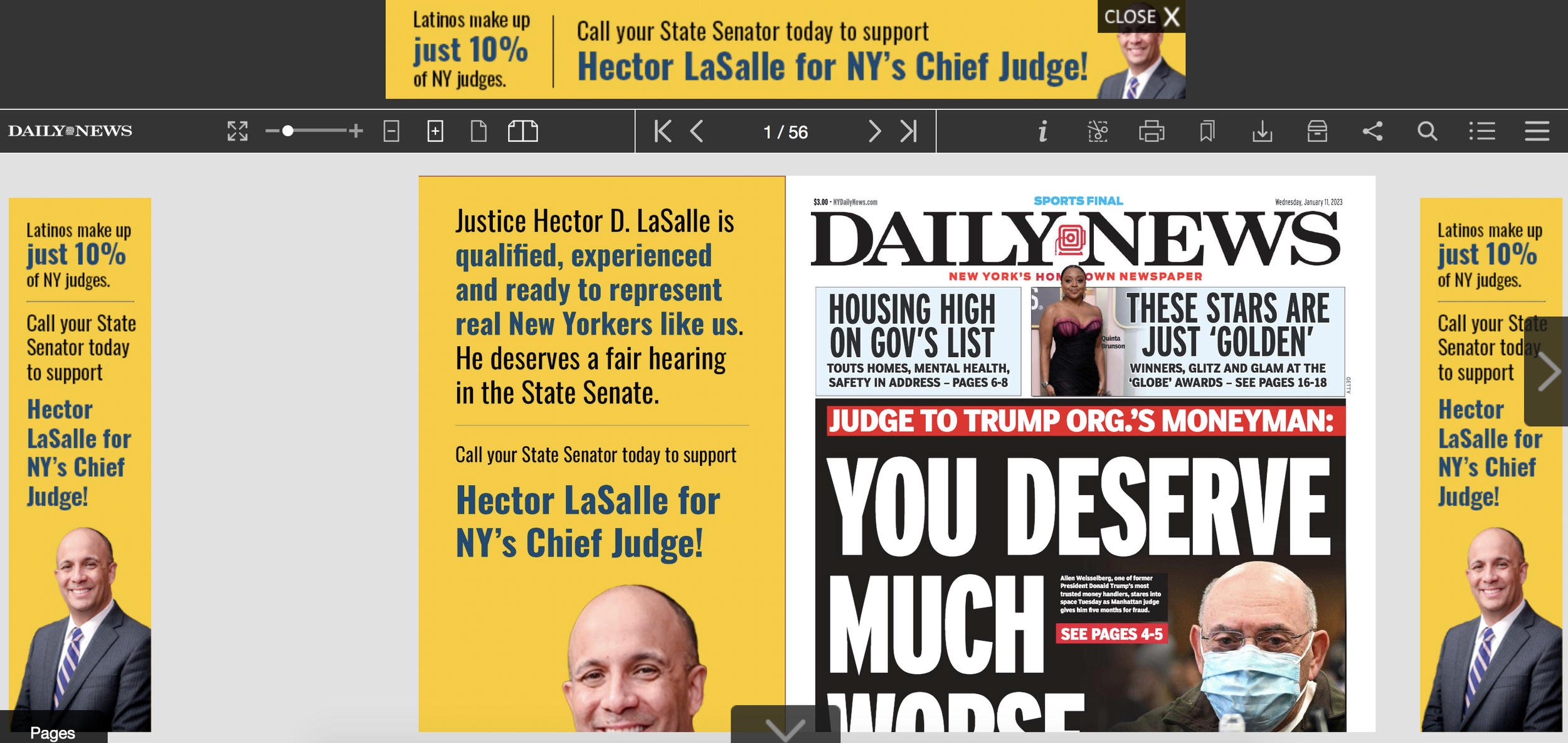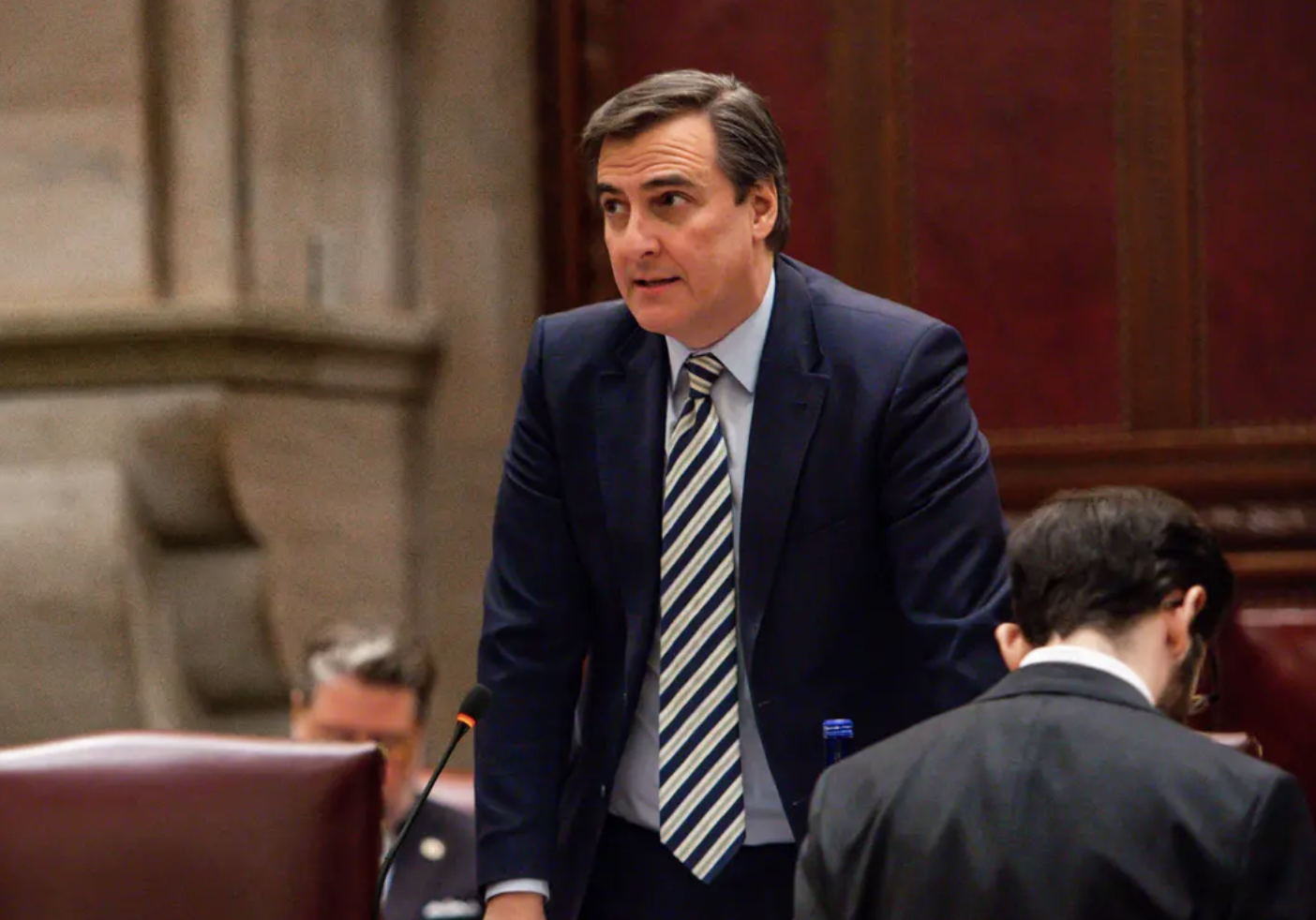Lawmakers look to close lobbying loophole after money floods LaSalle fight
/Signs in support of the chief judge nomination of Hector LaSalle that were paid for by Citizens for Judicial Fairness are held at a rally organized by Governor Kathy Hochul on Jan. 14, 2023. File photo by Don Pollard/Office of Governor Kathy Hochul
By Jacob Kaye
In the weeks leading up to the State Senate Judiciary Committee’s hearing on the governor’s controversial pick for chief judge, a series of paid advertisements began appearing online.
The ads, which voiced support for Hector LaSalle, who Governor Kathy Hochul nominated to serve as the top judge in the state in late December, were blasted on the website of the New York Daily News and targeted to New Yorkers browsing on Facebook. A couple of days before the hearing, Hochul held a rally to drum up support for LaSalle – behind her, rally goers held signs that looked nearly identical to a number of the online ads.
It was all paid for by Citizens for Judicial Fairness, an opaque lobbying group that, until last year, was focused exclusively on reforming Delaware's top business dispute court. The group, which was formerly known as Citizens for a Pro-Business Deleware, was created by Tusk Strategies, a powerful New York-based lobbying firm, and run by Tusk’s CEO, Chris Coffey.
But little else was known about the group and where the money used to purchase the ads and the signs came from. That’s because Citizens for Judicial Fairness, which reportedly spent between $75,000 and $100,000 on the campaign, wasn’t registered as a lobbyist with the New York State Commission on Ethics and Lobbying in Government – and it didn’t need to be.
Two high-ranking lawmakers in Albany are now trying to change that.
Several weeks after the Eagle first reported on Citizens for Judicial Fairness’ pro-LaSalle campaign and its connection to Tusk Strategies, Senate Deputy Majority Leader Michael Gianairs and Senator Brad Hoylman-Sigal announced that they are co-sponsoring legislation that would require lobbying efforts around judicial nominations to be reported to the state.
Currently, advocating for a certain outcome in a judicial nomination process is not considered lobbying by the New York State Commission on Ethics and Lobbying in Government.
The commission has never issued an opinion on whether or not such advocacy could be considered lobbying and has never been asked to do so, according to a spokesperson for the commission.
“This is a gaping loophole that needs to be filled,” Gianaris, who represents a section of Northwest Queens, told the Eagle. “To have six figures spent trying to influence the legislature, and for the public not to be able to discover where that money is coming from is a real problem.”
“This [nominee] would potentially be the highest ranking member of the state's judiciary – who has such a great interest in spending so much money to put him in that position?” Gianaris added. “I think those are legitimate questions.”
An example of some of the advertisements paid for by Citizens for Judicial Fairness that appeared on the New York Daily News’ website in January. Screenshot via Daily News
Citizens for Judicial Fairness was not the only group pushing for or against LaSalle’s nomination.
Latinos for LaSalle, a group that formed as a counter to the growing opposition to nomination, also ran ads in support of LaSalle, in connection with Citizens for Judicial Fairness.
The group featured a number of prominent former elected officials of Latino descent and counted Luis Miranda, a political consultant and father to Broadway star Lin Manuel Miranda, and Roberto Rodriguez, a longtime lobbyist, as its supporters.
Taking the opposing view, the Center for Community Alternatives, a criminal justice advocacy group, formed The Court New York Deserves and ran a campaign urging the Senate to reject LaSalle – the Senate’s Judiciary Committee voted 10-9 against confirming LaSalle earlier this month and declined to send his nomination to the full Senate floor, a decision that has not yet been resolved.
But unlike both Latinos for LaSalle and the Center for Community Alternatives, little is known about the members of Citizens for Judicial Fairness.
Beyond Coffey, who serves as the group’s campaign manager, and iconic civil rights leader Rev. Al Sharpton, who is listed prominently on the group’s website as one of its supporters, the names of the group’s members are not publicly listed.
The group was formed around eight years ago by Tusk Strategies and the founder of New York-based translation company TransPerfect after Deleware’s Chancery Court forced a sale of the company. Around 5,000 employees of the company came on as the group’s earliest members.
“They formed in April of 2016 to focus on raising awareness with Delaware residents, elected officials, and other stakeholders about the unprecedented, forced sale of TransPerfect,” a 2022 press release for the group reads. “While their primary goal of saving the company has been accomplished, they continue their efforts to fight for more transparency in the Delaware Chancery Court.”
Tusk Strategies lists both Citizens for Pro-Business Delaware and Citizens for Judicial Fairness under a section of its website titled “Wins.”
Last year, the group changed its name and its advocacy efforts, pushing diversity efforts on the Chancery Court, which, at the time, did not have a single non-white judge.
“Tusk refocused the energy of the 5,000+ member grassroots advocacy it formed to help save TransPerfect to fight for systemic reforms,” Tusk’s website reads. “The group was rebranded as Citizens for Judicial Fairness and the goal was to bring transparency and equity to Delaware’s courts and criminal justice system.”
According to Coffey, although the group’s Delaware efforts are separate from its advocacy surrounding LaSalle’s nomination, the goals behind both align.
“This is a group that has spent lots of time, money and resources fighting for diversity and other things,” Coffey recently told the Eagle. “This is just another chapter in that fight and we’re proud of that work.”
Coffey declined to tell the Eagle who was financially supporting the pro-LaSalle effort but said that the funds came exclusively from “three of four…Latino donors.”
Though the group ran a paid advertising campaign, it did not lobby lawmakers directly, according to Coffey.
Senate Deputy Majority Leader Michael Gianaris is planning to introduce legislation that would require lobbying efforts surrounding judicial nominations to be reported with the state. Photo via Gianaris’ office
But Gianaris said that regardless, the names of the people funding such campaigns should be reported to the state and known to the public.
“It's long been understood that shady, secret financing of issue campaigns are a problem, because we don't know who is trying to influence the decision maker and for what reason,” said Gianaris, who was the highest-ranking lawmaker to publicly state that he’d vote against LaSalle’s nomination.
The sentiment was echoed by Hoylman-Sigal, who chairs the committee that rejected LaSalle.
“Earlier this month, the Judiciary Committee of the New York State Senate held nearly five hours of public hearings to review the qualifications of the Governor’s nominee for the Chief Judge of New York’s highest court," Hoylman-Sigal said in a statement. "However, behind closed doors, dark money from unknown donors was being raised to influence the State Senate’s confirmation process.”
“The public deserves to know who contributed to this campaign and how much money was spent, just as the law requires for political and lobbying campaigns,” he added.
The legislation is expected to be introduced in the Senate by the end of the week.






